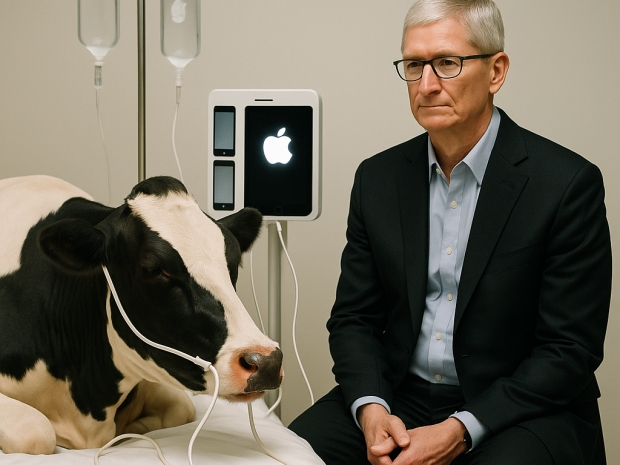In its fiscal fourth-quarter report, Job’s Mob posted earnings of $1.85 per share on revenue of $102.47 billion, slightly ahead of what the cocaine nose jobs of Wall Street had expected. But investors were less impressed once they spotted that iPhone revenue fell short of forecasts again.
The company brought in $49.03 billion from iPhones, below the predicted $50.19 billion. Tim Cook blamed supply constraints, claiming that “we’re supply-constrained on several models of the iPhone 17.”
For the full fiscal year, Apple booked $416 billion in revenue, up six per cent, and a net income of $27.5 billion. The market barely moved. Cook went on CNBC to reassure everyone that things were fine, predicting sales growth of between 10 and 12 per cent next quarter.
“We expect that this will make the December quarter the best ever in the history of the company,” he said.
Apple’s forecast would mean roughly $137.9 billion in sales next quarter, which is more optimistic than Wall Street’s $132.3 billion estimate. Cook also said the iPhone 17 had received an “off the charts” reception and that store traffic was up significantly. He stopped short of explaining why sales were still lagging.
In China, one of Apple’s most important markets, revenue slipped by four per cent to $14.5 billion. Cook insisted that growth would return in the next quarter thanks to stronger iPhone 17 availability.
The iPad division continued to stagnate, stuck at $6.95 billion in sales. The Mac did slightly better, pulling in $8.73 billion, helped by refreshed models using the M5 chip.
Services rather than hardware were Apple’s real moneymaker, growing 15 per cent to $28.75 billion. The division covers App Store sales and subscriptions for Apple Music, iCloud and other services, which remain the company’s most reliable source of recurring revenue.
Chief financial officer Kevin Parekh told investors that services would accelerate further growth in the current quarter. In other words, Job’s Mob plans to extract more money from subscriptions rather than selling new hardware.
Apple’s talk about artificial intelligence did little to impress. Cook confirmed plans for a revamped Siri and an “Apple Intelligence” suite that uses OpenAI Group PBC’s ChatGPT.
Unlike Microsoft, Amazon and Google, the company is keeping its AI spending small, with capital expenditure at $12.72 billion, up 35 per cent from the previous year.
Parekh said Apple would “leverage both first-party capacity as well as third-party capacity,” meaning it will mostly rent cloud power rather than build it.
The cautious approach has saved money, but it leaves Apple lagging behind rivals that are investing heavily in AI infrastructure. Early reviews of Apple Intelligence have been mocking, with users saying the features feel half-baked compared with ChatGPT and Google Gemini.
Cook mentioned the ongoing hit from US President Donald Trump’s trade tariffs, claiming Apple absorbed $1.1 billion in additional costs rather than raising prices. He expects that to rise to $1.4 billion next quarter.
Shares in Job’s Mob rose by two per cent after-hours, leaving the stock up only eight per cent so far this year. The broader S&P 500 has climbed nearly sixteen per cent.

